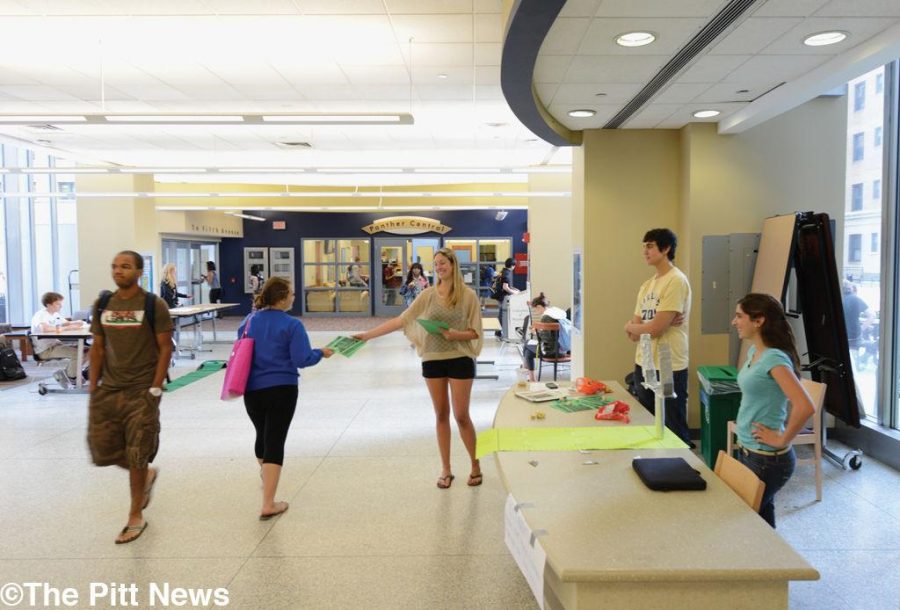Toilets, lightbulbs and blinds: Students create sustainability plan
October 29, 2014
In one week, four Pitt students earned $25,000.
The winners of the 2014 Sustainable Solutions Competition won’t use their wins for books, shoes or food — instead, they’ll buy toilets.
Pitt students made up five teams of three to five people and competed last month to create the most effective plan to make the campus more sustainable. The winning project received $25,000 to make their plan a reality. The winners, members of the group called “Project Towers,” devised a five-step plan to transform Litchfield Towers into “sustainability central.”
“Project Towers” proposed dual-flush toilets — meaning that when the handle is pulled up for liquid waste, less water is used when the toilet flushes — a switch to LED lights from compact fluorescent bulbs, water bottle refilling stations in the lobby and shades over windows to reduce cooling costs in the warmer months.
“There were four of us, and we were all brainstorming different ideas, and we all had our own interests and wanted to combine all of these. So we were walking through Towers Lobby and realized it was a very central place in campus and thought it would be a good place to implement all of these things,” Nick Hufnagel, a senior French and urban studies major, said.
The judges, members of PittServes, a branch of the Office of Student Affairs which connects students to community service opportunities, only intended to award one prize. The 11-person panel decided to award a last-minute second place to the “Big Belly Trash Compactors” group. PittServes awarded the “Big Belly” group roughly $10,000 of Student Affairs sustainability funding to purchase three trash compactors for the campus. The group said they are still thinking about where they would like to place the compactors.
“Having a venue for students to come together and share their interdisciplinary skills and craft solutions for campus allows for innovation,” Misti McKeehen, director of PittServes, said.
The “Big Belly” compactors would use solar power to crush the trash within the can once it reaches a certain amount, Miguel Pelino, a member of the “Big Belly Trash Compactors” group, said.
“[The compactors] eliminate the need to empty [the trash] multiple times a day, saving a lot of manpower, conserving fuel with fewer trips to go pick it up, eliminating overflow, reducing carbon footprint, etc.,” Pelino, a senior civil engineering major, said. “And they’re just so cool.”
Joseph Brown, a sophomore engineering major and another member of the group, said he has high hopes for the effects of the trash compactors once they are placed on campus.
“I hope that people see the trash compactors and think about what they are throwing away, as well as enter the design competition that we are planning on having for the exterior of the trash cans,” Brown said. “Also I hope that their locations will be strategic and reduce the amount of unsightly trash on campus.”
Pelino said right now the trash compactors look similar to something one would find in the mall, but that the group would like to “revamp” them to show their Pitt pride.
The sustainability teams will begin implementing these ideas with Student Affairs and PittServes. PittServes will select a sustainability program coordinator, McKeehen said, which they hope to accomplish by the end of November.
According to McKeehen, the coordinator will work with students, faculty and staff to make sure these ideas become a reality.
“We are searching for someone with excellent sustainability knowledge and experience that can connect with the students to integrate sustainability into all that we do,” McKeehen said.
Plans for next year’s contest are already underway.
“I met a lot of really cool people that were passionate about sustainability. It would be splendid to work with them on other projects, including this one again next year,” Brown said.








